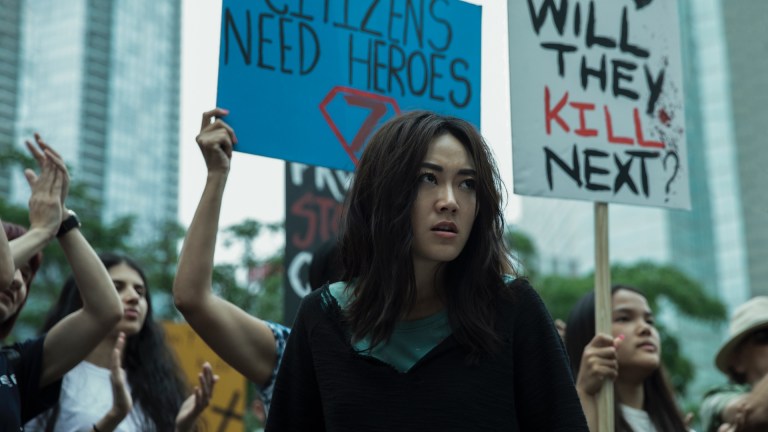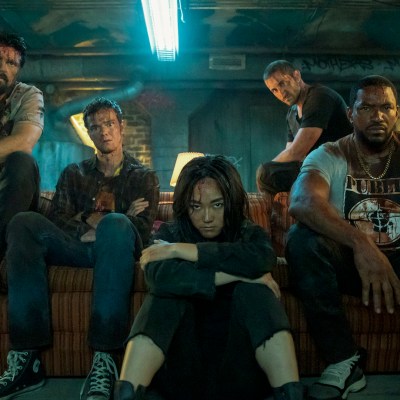The Boys Season 2 Puts a Friendly Face on Fascism
The cast of The Boys and showrunner Eric Kripke discuss the series’ depiction of a world gone mad in season 2.

There’s a quote out there floating in the American ether, often misattributed to Upton Sinclair, that reads “When fascism comes to America, it will be wrapped in the flag and carrying the cross.” Amazon Prime’s The Boys takes this quote and concludes “Kinda subtle. Why not have it shoot lasers out of its eyes too?”
The first season of The Boys, based on the comic of the same name by Garth Ennis and Darick Robertson, was an in-depth exploration of all the creative and colorful ways fascism can come to America. It combined hero worship, celebrity culture, unhinged capitalism, and diseased politics into a view of a country where superheroes really are the ubermensches fascist were waiting for. Understandably, many reviews and critics thought this was all a bit…on the nose. But since the show premiered in July of 2019, reality has decided to shove our noses into just how close a friend America can make of extremism.
The Boys season 2 is set to arrive on September 4, amid an election season dominated by a fear of a pandemic, questions of voter suppression, and a head of state openly musing about serving more than two terms. Now all we’re missing is the eye lasers.
“The mantra in the (writers’) room is ‘Bad for the world, good for the show,’” Boys showrunner Eric Kripke says. “Believe me, I wish this wasn’t the case, but we get a fire hose of material daily to inspire storylines and moments. There’s just so much happening so fast that would fit into this show.”
Kripke notes that much of the writing for The Boys season 2 occurred during the most recent American election season in 2018, when the president stoked fears of a “caravan” of migrants heading up from South America to jeopardize the All-American way of life. As such, “fear of the other” is one of the second season’s most timely themes.
Read more
The first season of the show revealed that superheroes (or supes) or not born but made through the use of Vought International’s pharmaceutical product Compound V. By the end of that season, Seven leader and blonde-haired American golden boy Homelander (Antony Starr) had ensured that some Compound V had made it into the hands of America’s enemies in the Middle East, giving his team a new crop of supervillains or “superterrorists” to contend with. Much of season 2 features scenes of frightened masses of people, holding up xenophobic signs and protesting.
“I think it’s timely, man. I think it’s timely,” Laz Alonso, who plays Boys’ resident medic Mother’s Milk says. “We shot this stuff last year. And so it’s amazing how predictive a lot of the writing was last year as to the tonality and what conversations are happening when season two actually premieres. You would think that we shot it during the last five months.”
Highlighting the show’s nuanced approach to extreme ideologies in America is a new character to the series straight from the comics – albeit with a major cosmetic switch. Aya Cash plays Stormfront, a charming new supe who is more than able to work a crowd. Her friendly demeanor and social media mastery masks a darker persona.
“For anyone who knows Stormfront in the comics, it’s sort of what you see is what you get from the very first moment you meet him. And that’s not really how hatred works these days,” Kripke says.
“I think a lot of people espouse hateful ideologies cloaked in a pretty savvy, even sometimes attractive, social media packaging. They say they’re coming off as disruptors, or free-thinkers. A lot of times they’re even good-looking young men and women to attract a younger generation. Then you dig deeper into that and you realize that they’re peddling the same old bullshit that people have been peddling for a thousand years.”
In her gender-flipped transition from the comics, Stormfront becomes emblematic of a new, more insidious branding of white nationalism – one that knows how to put on a friendly face. That’s a phenomenon that has become more evident in our own world, dating back to 2016 and glowing profiles of the burgeoning of the “alt right.” But it’s always been evident in the world of The Boys, where entertainment and fascism operate hand-in-hand.
“The show just happens to be sort of the perfect metaphor for the exact moment we’re living in, where authoritarianism and celebrity combined, Kripke says.
Just as is the case in season 1, the superheroes of the show’s world are celebrities first and foremost and helpers of the public second…even the heroes who have fallen from grace. Super speedster A-Train (Jessie T. Usher) finished last season brought down by a heart attack from abusing Compound V. Meanwhile the be-gilled fish communicator The Deep (Chace Crawford) remains in exile in Sandusky, ostensibly for the crime of sexually assaulting a fellow Seven member – but really for embarrassing the team and having a lame power. As individuals in the public eye themselves, both Usher and Crawford reflect on what the show has to say about celebrity culture and its dystopian leanings.
“But being out in Hollywood, you do see different things reflected that can help you understand that theme of ‘you don’t want to meet your heroes.’ Some of our characters, the celebrities, put on such a good face and then they can drop it in an instant like Homelander,” Crawford says.
“If I had just walked into this industry, I wouldn’t really understand what that means to a person trying to navigate through normal life with the pressures of being a public figure,” Usher adds. “A lot of that played into A-Train’s psyche in season one. You see when that status gets stripped from him at the time when he broke his leg, how that really affected him. And you can kind of understand that. In season two it becomes even more of a thing for him.”
Though The Boys’ depiction of fascism is bright, colorful, and influenced by celebrity culture, its depiction of its titular team in opposition to those extreme forces is anything but. Season 2 begins with The Boys on the run, disavowed by the CIA and having to fight back against The Seven on their own terms. In fact, they’re quite literally underground, in a dismal environment far away from the glitz and glamor of Vought’s heroes.
“The Boys are basically in quarantine at the beginning of season two,” Alonso says. “They purposely put us in these rough environments, because if you’re on the run and you’re literally living off of the scraps that you make. You don’t have any luxury, you’re making ends meet and you’re living off of crumbs until you can finally find your way out.”
“What Eric Kripke and the writers managed to do is draw up a very clear picture of the polarity between the haves and the have nots,” Karl Urban (who plays leader Billy Butcher) adds. “That’s what makes The Boys’ side of this show imminently relatable because we don’t have all of the assets at our disposal. We are trying to fight the good fight from a position of huge disadvantage.”
That’s the flip side to The Boys season 2 increasingly blending shiny entertainment and fascism. It reveals that doing the right thing and fighting the good fight is often deeply unpopular. Like Stormfront, the forces of darkness don’t always appear dark at all. In fact, sometimes they even get their own line of toys, like the bone-chilling laser babies Amazon sent out as promotional items for the show’s second season.
Even Kripke knows that marketing and branding for the forces of evil is often more fun.
“I love the cuddle buddies.They’re the stuffed animal versions of the Seven that we really ended up producing. We have a whole room full of them. And the Translucent one doesn’t have a head. I just love that we put so much effort into these dumb things.”
The Boys season 2 premieres its first three episodes on September 4 on Amazon Prime.

